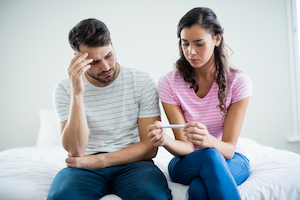The first two or three “negatives” on the home pregnancy test are disappointing but not earth-shattering. By the 6th, 9th, 15th – it can start to feel hopeless.
But is it hopeless? Or do you just need to be more patient? When is it time to keep trying, and when is it time to seek help from a fertility specialist?
Signs You May Be Facing an Infertility Diagnosis
Infertility factors are more common than you think. The current data tells us that about 12% – or one in eight couples – will struggle to get pregnant. The brunt of infertility diagnoses are shared equally between men and women (called multiple factor infertility), so do make sure that the two of you are making equal efforts to promote fertility health, and both of you should be tested if you’re not getting pregnant within a reasonable time frame.

You’re timing it correctly, and things still aren’t “working”
People mistakenly believe you have to time conception with ovulation. While you do have to ovulate to conceive, waiting until you ovulate means you’re waiting too long because the egg only “lives” for about 12- to 24-hours. The sperm, however, live much longer.
Read, Timing Matters: How to Increase Your Odds of Conception, to make sure you’re “doing it right.”
You’ve been trying for 12-months or more
The reality is that age definitely matters when it comes to both quality and quantity of eggs, so after age 38, time is of the essence, particularly if there’s an unknown-to-you infertility factor in the mix.
- If you’re 35-years or younger, and you’ve been trying to get pregnant for 12 consecutive months (or longer), it’s time to seek fertility assistance. Odds are, something is requiring specialized attention.
- If you’re 36- to 40 years old, you should seek help after six consecutive months of trying.
- If you’re 40-years or older, give yourself three- or four months and then seek help more immediately.
You have a known infertility factor
Conditions such as endometriosis, PCOS, or fibroid tumors are leading causes of female infertility. The caveat is that they aren’t an infertility diagnosis on their own because plenty of women with these conditions get pregnant without assistance. However, suppose you have a diagnosis known to cause infertility. In that case, your doctor will probably want to refer you to a fertility specialist sooner rather than later if you aren’t getting pregnant on your own.
You’ve been pregnant before…but now it’s not working
One of the best things about getting pregnant quickly the first time around is that you have a sense of assurance that you don’t have an infertility problem. Unfortunately, secondary infertility (the inability to get pregnant when you’ve already had a baby) is twice as common as primary infertility – partially the result of age and partly the result of other factors.
If you got pregnant fairly quickly the first time around but are struggling this time – it’s worth checking in with your doctor.
You’ve miscarried for the 3rd (or more) time
One or two miscarriages aren’t that uncommon (but are devastating, just the same). However, three or more miscarriages – particularly in succession – are a sign that something diagnosable is the cause. This could be an anatomical abnormality, or it could be the sign you’re a carrier for a chromosomal or genetic birth defect. Identifying the cause of the miscarriages will help you get pregnant – and stay pregnant – via testing, treatment, and/or an assisted fertility treatment.
Mt. Naomi Women’s Health is here to promote your fertility health and support you through healthy conception, pregnancy, labor, and delivery. If we think an infertility factor is blocking you from getting pregnant, and we aren’t able to treat it, we’ll refer you to the best fertility specialists in the area – and then look forward to providing exceptional prenatal care once you conceive.
